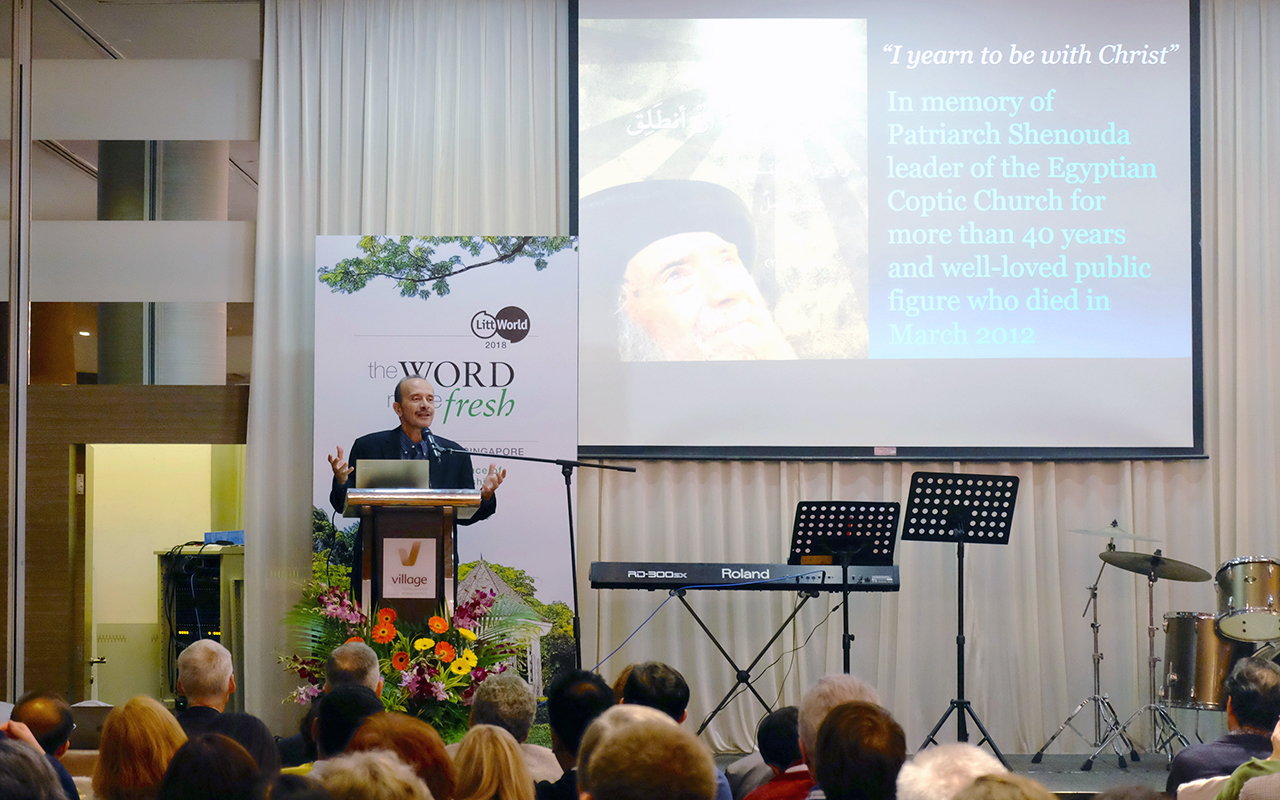
Ramez Atallah, General Director of the Bible Society of Egypt, sharing how a timely tract was published in response to the horrific martyrdom of Egyptian Christians in 2015. Photo by Annette Chen at LIttWorld 2018.
“Two rows of men walked the shore of the sea,
On a day when the world’s tears would run free.
One a row of assassins, who thought they did right,
The other of innocents, true sons of the light.”
This poem was written by an Egyptian medical doctor in Arabic, translated into English and then eventually, into 10 other languages.
Printed on the back of a simple tract called Two Rows by the Sea, it came with four questions that started with “Which row …?” and some carefully-selected Scripture.

Two Rows By the Sea (English and Arabic translations), a tract produced by the Bible Society of Egypt in 2015.
It was the response by the Bible Society of Egypt in reaction to a horrific event that shook the nation in February 2015.
The Word made fresh
Ramez Atallah, the General Director of the Bible Society of Egypt, shared this poem at the opening keynote of LittWorld 2018.
LittWorld, the only international conference of its kind providing intensive training on strategic topics for Christian publishers and writers, is convened every three years by Media Associates International (MAI)
This year, the conference is being held in Singapore from October 28 to November 2.
Speaking on “Allowing God’s Word to Address a Troubled World“, Atallah talked about the enduring nature of the written word and its characteristics. Comparing it against the spoken word, Atallah remarked: “Both can communicate, but print endures – it can go deeper and is longer-lasting.”
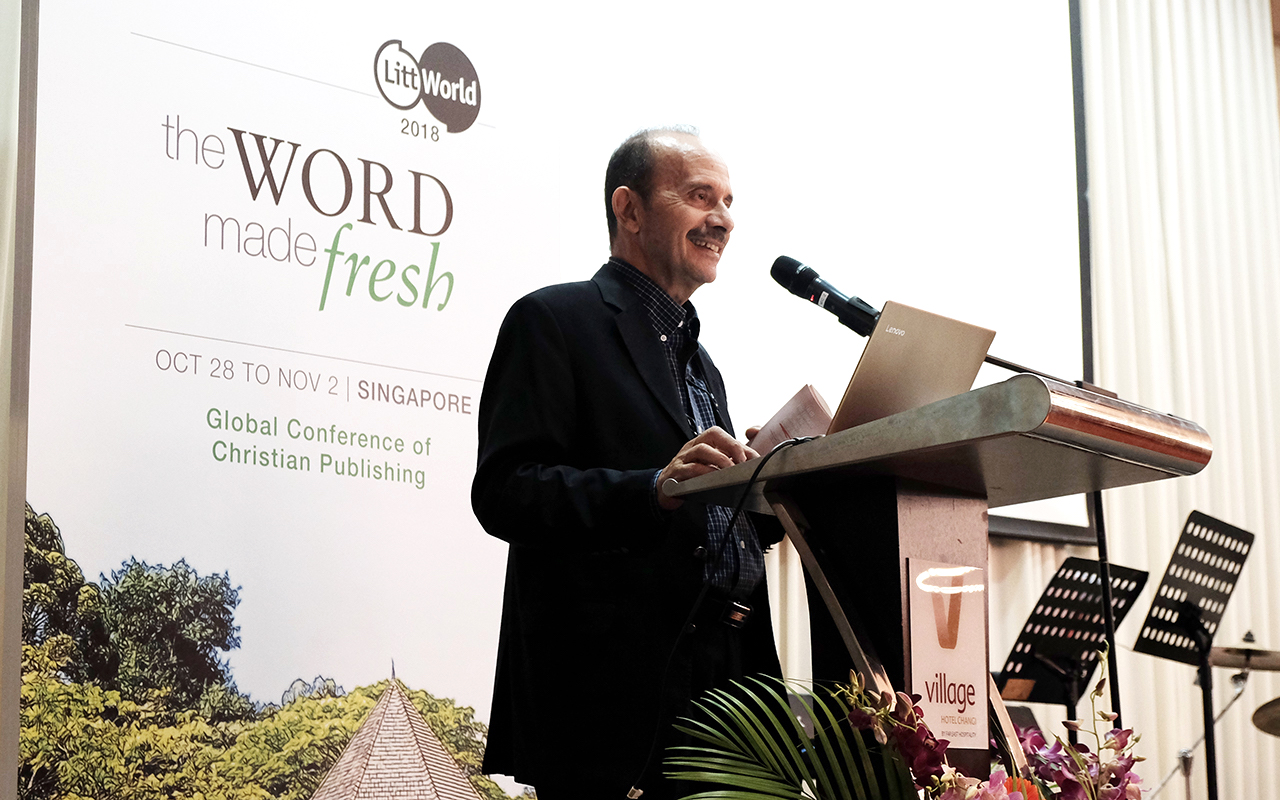
Ramez Atallah has been the General Director of the Bible Society of Egypt for the past 28 years.
He began by joking that he couldn’t get much credit for Bible publishing because the Bible is the world’s bestseller book and it sells itself. So, instead of choosing to speak of the relevance of the Bible, this Bible publisher chose to talk about tracts.
Using examples of tracts published by the Bible Society of Egypt, Atallah illustrated the power of God’s Word when rightly communicated in these troubled times.
Two Rows by the Sea was one such example.
A nation’s horror
On Sunday, February 15, 2015, a video showing the martyrdom of 21 Egyptian Christians was released by terrorists. It was a graphic five-minute display of depravity.
The hostages in orange jumpsuits were marched along a rocky beach, each accompanied by a masked man dressed in black. Made to kneel in front of their executioners, the Christians were beheaded simultaneously. Footage also showed a closeup of the blood swirling in the seawater.
This was a video that shocked the whole of Egypt – a country not unaccustomed to violent acts of terror.
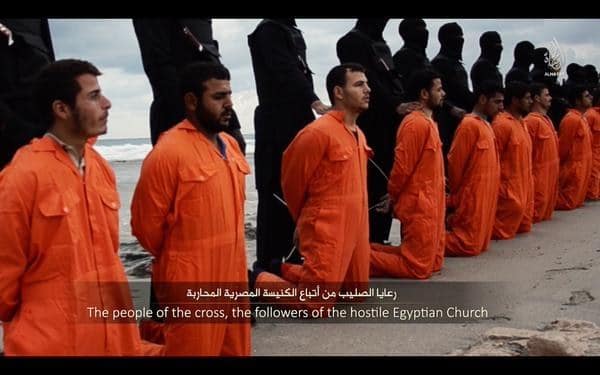
A screengrab of the gruesome video. Atallah shared that, one day after the video was released, a young staff at the Bible Society of Egypt told him: “Now I know that what we have been taught in history about Egyptian Christians being martyred is not just history … there are Christians today who are brave enough to face death rather than deny their Lord. When I saw these young men praying as they were being prepared for execution and then many of them shouting ‘O Lord Jesus’ as their throats were being slit, I realised that the Gospel message can still help us to hold on to the promises of God even when facing death.”
In response to the video, Egyptian President Abdel Fattah el-Sisi expressed his condolences on national television and declared an unprecedented nation-wide mourning for seven days.
“We often give information and then we think we’ve done our job. God is calling us to communicate.”
On Monday, February 16, there was news that the Egyptian military had launched airstrikes and bombed the group’s known locations at dawn.
It was also the day Atallah activated his team to put the tract together and address the issue of martyrdom.
Early Tuesday, the publication was at the printers. By Wednesday of that same week, one million Arabic copies were distributed across Egypt. Another 650,000 tracts were given out by Thursday morning.
The poem ended on a haunting note:
“A question…
Who fears the other?
The row in orange, watching paradise open?
Or the row in black, with minds evil and broken?”
Atallah went on to share stories of how people reacted to the tract. Amazing testimonies came, one after another – there was no doubt that lives had been touched. Not just by the martyrdom of the 21 Christians, but by the Word of God put out in a creative, timely manner.
“It impacted the nation – even the world!”
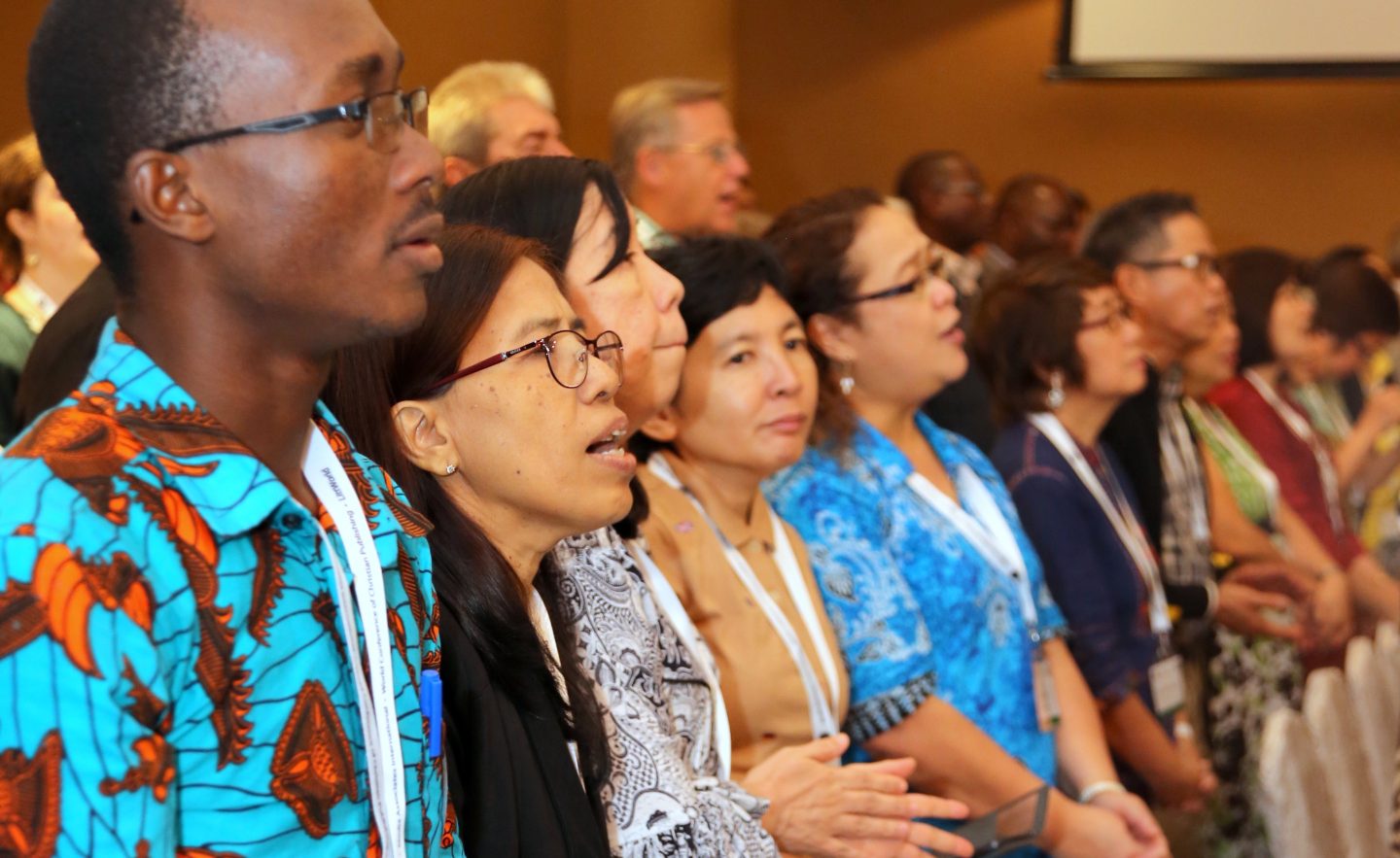
LittWorld delegates during worship on the opening night. Photo courtesy of LittWorld.
Atallah cautioned: “And I’m not saying that every situation has something appropriate to respond to.”
“When you do these things, you don’t know what will happen or whether there is an impact. Some have flopped though they were well done. But this was anointed by the Holy Spirit.”
Atallah paused. “And God used it in a way we didn’t expect.”
Communicating ideas, not just words
Putting words to a principle that he had so masterfully illustrated, Atallah said: “Creativity and communication are very, very important. We often give information and then we think we’ve done our job.
“God is calling us to communicate.”
“Thinking locally, writing globally is like sharing your immediate family’s experiences with your extended family members.”
While Atallah addressed communication with words on Sunday night, Pusonnam Yiri, a Nigerian author, publisher and consultant, spoke about the communication of ideas in his talk on Monday morning.
In a talk entitled “Thinking Locally, Writing Globally”, Yiri challenged delegates’ perspective of writing.
“Ideas are like visitors – if you welcome one, you have more. And ideas are travellers – they cannot be caged.”
Yiri continued: “But ideas are also criminals; they don’t respect immigration laws! An idea can come from Africa … and be fertilised by another from America.”
He noted: “A few years ago, African writers produced local content for local consumption. That is a good thing.”
But he discovered this wasn’t enough.
Using many allegories to inspire a broader perspective, Yiri commented that there is much value embedded in the experience and culture of every individual, so “thinking locally, writing globally” is like “sharing your immediate family’s experiences with your extended family members”.
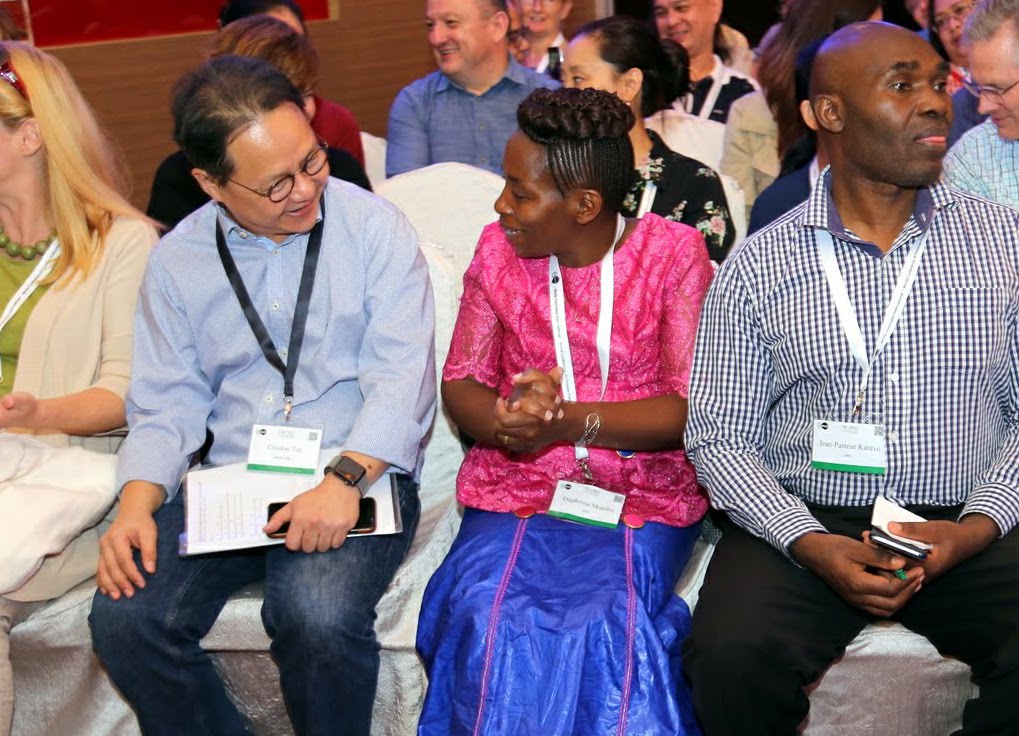
Many conversations and connections were made at this international Christian publishers conference where 260 delegates came from 52 nations.
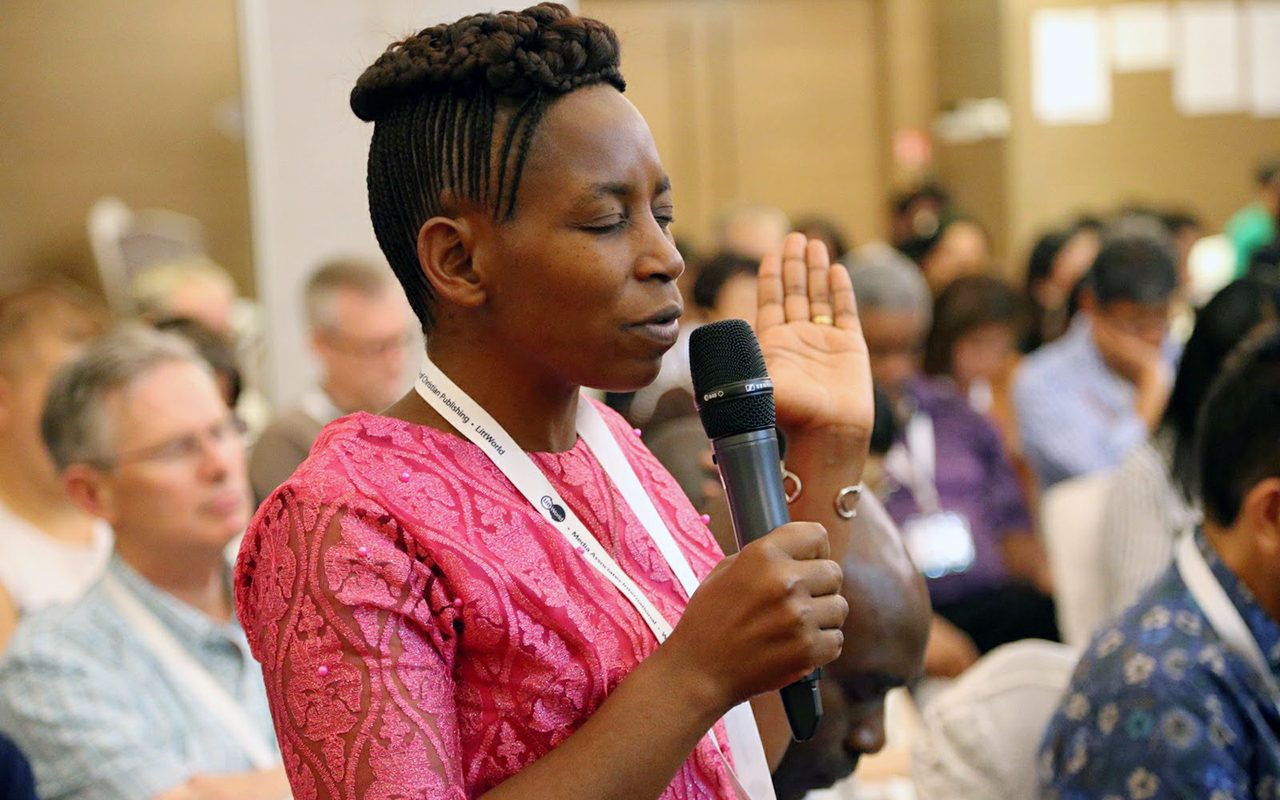
On the opening night, there was a time of prayer where delegates from different nations prayed in their native tongue before sharing their prayer in English.
Referencing Ecclesiastes 1:7, Yiri concluded: “Every local thinking is like a river flowing into the sea, while the global stage is like the sea. Any river flowing into the sea contributes to it.
“Take what is yours and make it ours.”
Write locally, think globally
Daniela Benevelli, the publishing manager and editor of the Bible House, Italy, is one of the first-time attendees of the conference this year.
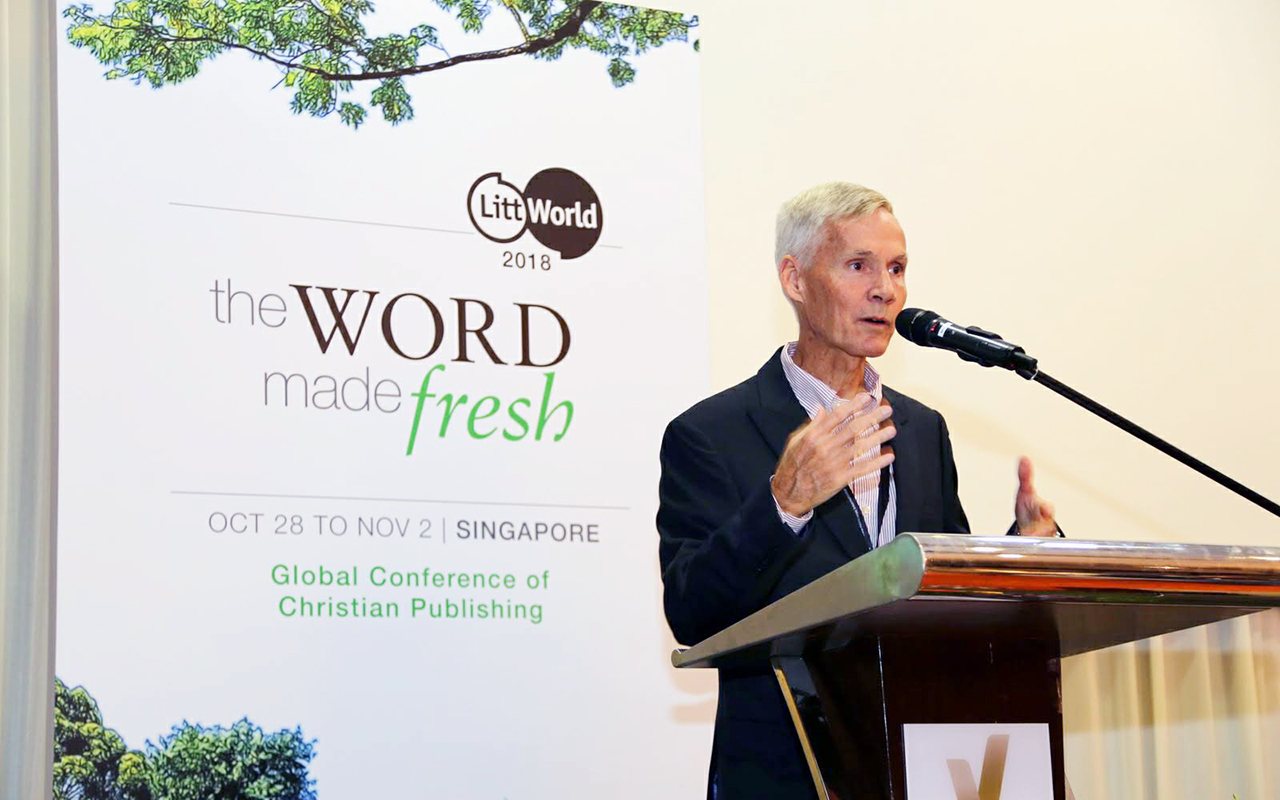
MAI President John Maust speaking at the opening night of LittWorld 2018. At LittWorld 2018, global Christian publishers and writers look at fresh ways to help today’s readers apply the power of the Bible in their everyday lives.
Referring to the plenary sessions, small group workshops, devotionals and consultations giving fresh vision and skills for heightened effectiveness, Benevelli told Salt&Light: “LittWorld is important not only for training and exposure, but also for the new relationships and connections that are made here.
“Often Christian authors think that they have a captive audience. But when you write, you have to be persuasive and seductive.”
“I want to see what God is doing in the world through the publishing and distribution of books and the Bible.”
Michael Collie, the National Director of SparkLit, an organisation that has similar objectives as MAI, is the chair for the track for designers and illustrators, one of the many tracks open to delegates. He shared how books can be made to be “engaging and easy to read”.
Collie, a publishing professional, is a graphic designer by training. He commented that the state of Christian publishing standards “vary a lot”.
He noted: “Often Christians, when they publish books, think that they have a captive audience. But when you write, you have to be persuasive and seductive.
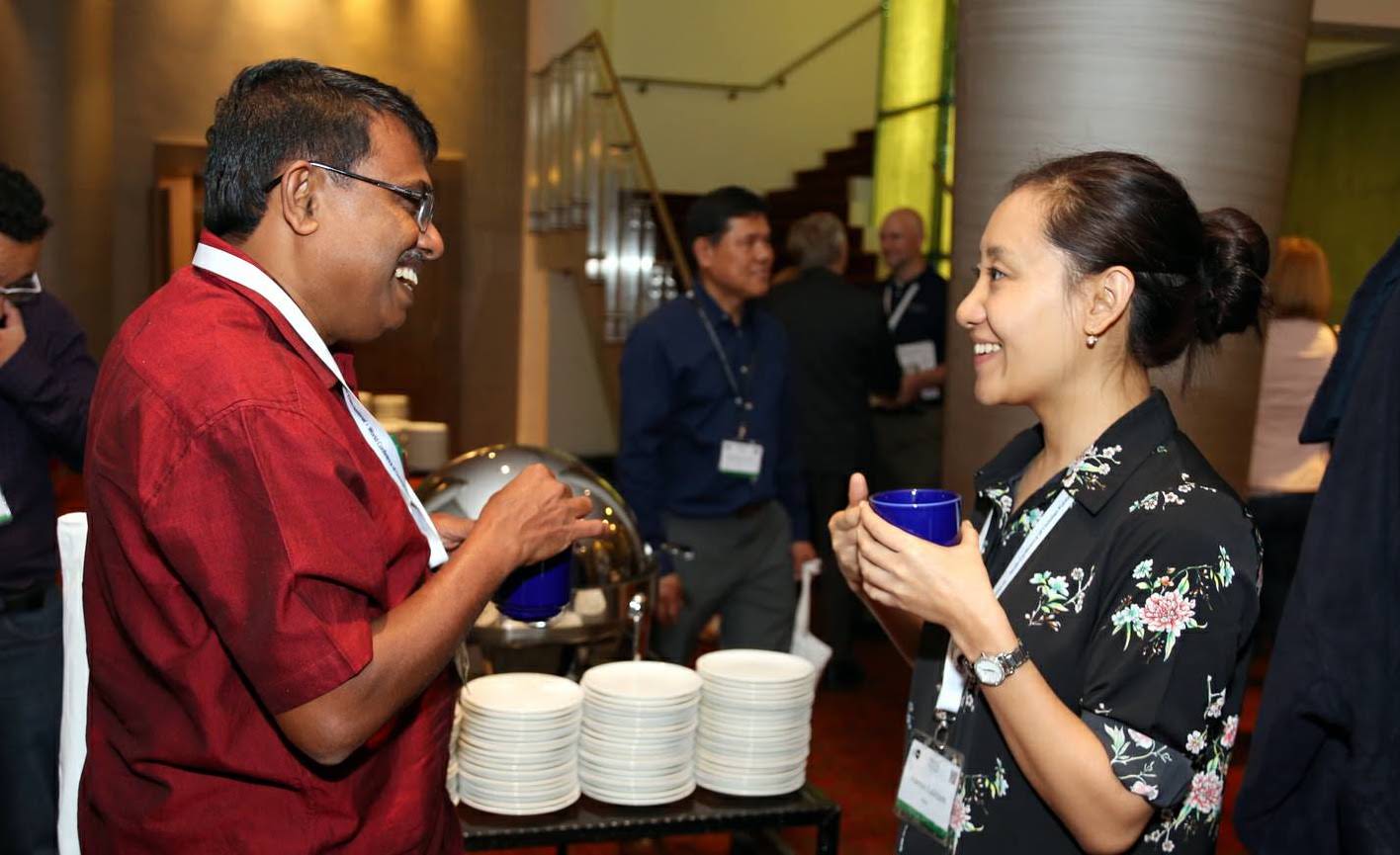
Delegates at LittWorld are encouraged to network and build professional relationships. Photo by Jeam Wong at LittWorld.
“It’s a bit like when you’re in love with someone, you spend a lot of time thinking, ‘How can I be in the right place, at the right time, dressed in the right clothes’ … that’s the persuasiveness in terms of seducing your reader.
“We’re privileged to be called God’s spokesmen in these challenging times. May we be not found wanting.”
“And that takes planning and thought,” he said.
“I want to help people publish great books, so that when others read those books, they will come to love and trust our Heavenly Father.”
Referring to the parables of Jesus, Collie added: “Each parable was an invitation, it drew people in. We have to be like Jesus and reach out to hearts and minds.
“That’s our vocation as Christian communicators.”
Addressing the eclectic mix of nationalities and professionals, local author and publisher, Rev Dr Tan Soo Inn from Graceworks, shared a thought on the opening night of the conference: “Listen and speak from the heart and encourage one another. We’re privileged to be called God’s spokesmen in these challenging times.
“And may we be not found wanting.”
We are an independent, non-profit organisation that relies on the generosity of our readers, such as yourself, to continue serving the kingdom. Every dollar donated goes directly back into our editorial coverage.
Would you consider partnering with us in our kingdom work by supporting us financially, either as a one-off donation, or a recurring pledge?
Support Salt&Light

![0001[31] 2](https://saltandlight.sg/wp-content/uploads/2025/02/000131-2-scaled.jpg)
